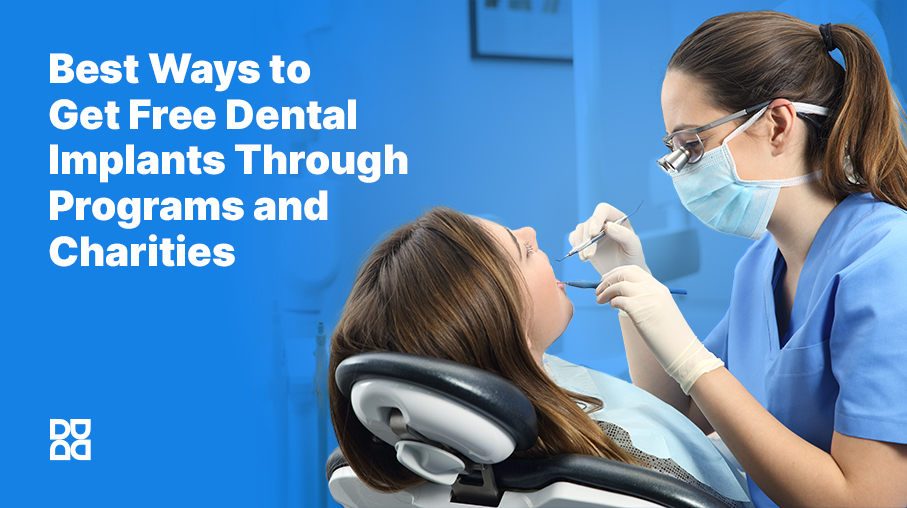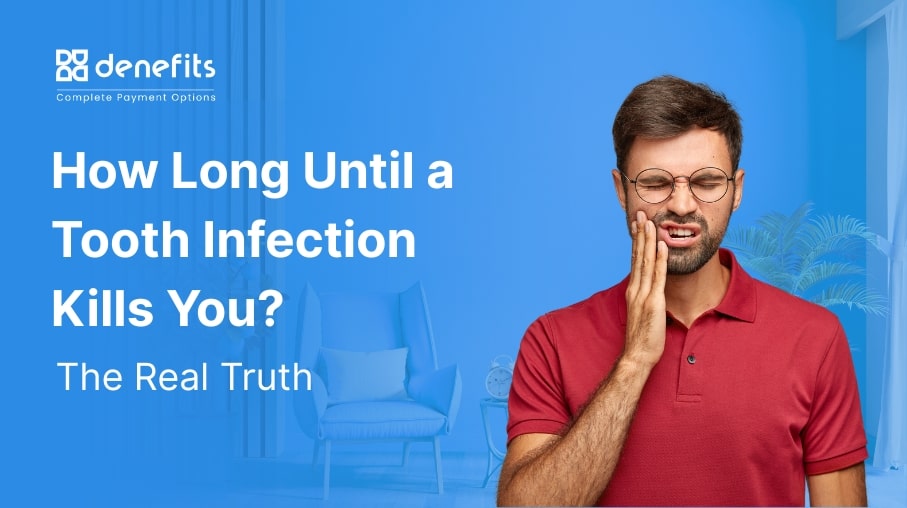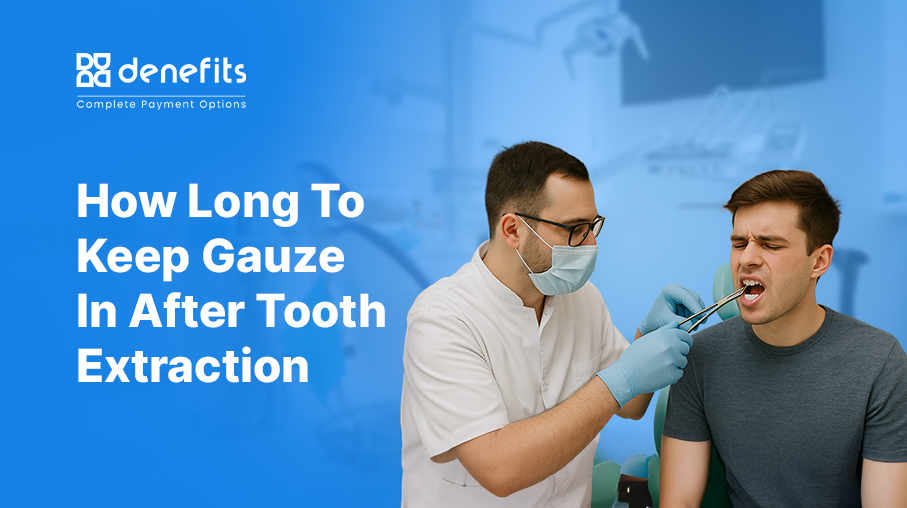
Four in ten adults currently have debt due to medical or dental bills.
And that's no surprise, given how expensive medical or dental treatments can be. But that doesn't mean one should avoid or delay such procedures. Especially if they disrupt daily routines or have long-term repercussions, such as Dental Implants. This is where the need for alternative ways to access such treatments without getting trapped in the debt cycle arises.
Say Goodbye to High Dental Cost
Discover How Dental Grants and Dental Payment Plans Are Changing the Game
Learn MoreIf you are consistently searching for queries like "cheap dental implants near me", "free dental implant programs near me", or "charities that help with dental costs", read on! In this blog, we'll explore everything about free dental implant programs and low-cost dental implants. Further, we'll answer the most frequently asked question: "Where can I find low-cost dental implants near me?"
Best Ways to Find Free Dental Implants for Low-Income Groups
I. Consider if you fit within the categories mentioned below
- Free Dental Implants for Seniors
- Free Dental Implants for Veterans
- Free Dental Implants for Disabled People
- Free Dental Implants for Low-Income Groups
II. Search for programs providing free or low-cost dental implants, for instance:
- Free Dental Implants from Clinical Trials
- Free or Low-Cost Dental Implants from Dental Schools
III. Discover dental implant financial assistance resources
- States that Cover Dental Implants Through Medicaid
- Charities that Help with Dental Costs
Keep reading below to find out more about free dental implants, and choose your option accordingly.
Free Dental Implants for Seniors
Are you over the age of 55 and don't know where to find a free dental implant? Don't worry. Start by typing "free dental for seniors near me" in your choice of search engine. Next, look into the Program of All-Inclusive Care for the Elderly (PACE).
This home and community-based program helps older adults eligible for nursing home care to maintain residence within the community. More importantly, the communities also help pay for services, like dental implants.
Furthermore, explore Medicaid coverage in your state for potential dental implant assistance. Additionally, consider looking into nonprofit organizations and charities that offer dental care aid for seniors. If these options do not cover your dental implant expenses, you may want to explore crowdfunding or fundraising as potential sources for financial support.
Free Dental Implants for Veterans
If you're a veteran, you are most likely to get some or all of your dental care through VA Dental Care (VADIP). So your first resort for free dental implants or low-cost dental implants, we suggest, should be VA.
However, you must first meet the eligibility criteria set by the VA Dental Care such as your military service history, current health, and living situation. With these criteria in mind, along with the ones categorized by the VADIP under different classes, you may be eligible to receive a specific benefit.
For instance, if you have a service-connected dental disability or condition for which you receive compensation (monthly payments), you fall under Class I and qualify for any needed dental care. These can include:
- Diagnostic services
- Preventive dental services
- Endodontic or restorative services
- Dental surgery
- Emergency surgery
Go through the entire eligibility criteria on VA's website. You can apply online by filling out the 10-10EZ health care application here.
Free Dental Implants for Disabled
In the United States, more than 15,000 volunteer dentists and dental labs participate in Donated Dental Services (DDS). They offer free dental treatments to those with disabilities. That being said, applicants must meet certain criteria. This includes not being able to afford routine dental care and lack of access to public aid for dental services.
Besides, several organizations and clinics offer free dental implants for disabled individuals based on financial need. Additionally, each state has local charities or foundations that provide financial assistance to those with disabilities. Also, Medicaid or Medicare may also cover dental implant costs for disabled patients. Be sure to explore all your options.
Free Dental Implants for Low-Income Groups
There are a few ways to get free dental implants for low-income individuals. One is through local community health centers. These centers deliver comprehensive and high-quality healthcare services. Dental implants may be one of them.
Moreover, they aim to provide mental and oral health care to the underserved. However, they also have certain criteria, including income, lack of citizenship, homelessness, and mental illness.
If you search for "free dental implant programs near me" you may find community centers, but certain organizations also offer dental grants, especially to low-income adults. Provided you meet their eligibility criteria.
Free Dental Implants From Clinical Trials
If you are really in need of free dental implants, being part of a clinical trial might be a good option. Typically, these trials are research studies conducted to find new treatments, validate the efficiency of drugs, test the functioning of new medical devices, and ensure whether a treatment is safe and effective.
Although you may hesitate to participate in a clinical trial for implants. However, patient safety is prioritized while these trials are carried and companies are extremely cautious since it can lead them into serious trouble.
Free or Low-Cost Dental Implants From Dental Schools
If finding charities that help with dental costs is an uphill battle, consider dental schools. These institutions often provide free or low-cost dental implants among other services. Many dental schools across states offer various treatments you can benefit from. Moreover, it is a part of their training programs and allows students to gain practical experience. So, it's a win-win situation. Additionally, reputable implant companies also collaborate with specialty dental residency programs to provide donated implants and equipment. This allows dental schools to offer free or low-cost dental implants to those in need.
Not sure where to start? Check out the list of schools that offer free dental implants provided by the American Student Association.
States That Cover Dental Implants Through Medicaid
If you're seeking free dental implants for low-income groups, Medicaid may also cover your dental implant expenses. Especially if your income level is under the Federal Poverty Level. And you require implants for a serious underlying health issue. However, it's important to note that approximately one-third of Medicaid participants do not have dental coverage. Moreover, dental coverage under Medicaid varies by state. Go through the following table to understand the dental care benefits available in various states.
| State | Benefits | Description |
|---|---|---|
| California | Extensive | If shown to be medically necessary, services can go beyond the yearly $1,000 limit. |
| Pennsylvania | Limited | The dental services you may get are based on your eligibility category, age and need. |
| New York | Extensive | No spending limit; covers preventive, periodontal, dentures, and oral surgery services. No orthodontia. |
| Alabama | None | Medicaid does not cover any type of dental care for adults. |
| Florida | Emergency | Emergency-based dental services covered only. |
| North Carolina | Extensive | No spending limit; covers preventive, periodontal, dentures, and oral surgery services. No orthodontia. |
| Delaware | None | Medicaid does not cover any type of dental care for adults. |
| Georgia | Emergency | Adult Medicaid participants may qualify for dental services if it is life threatening or in the emergency room, but this is on a case-by-case basis. |
You can check the Medicaid adult dental benefits coverage by state here.
Charities That Help With Dental Costs
If you are not eligible for free dental implants under a specific category or are hesitant to enroll in programs, don't lose hope. There are other ways. One of the best ways is to seek out a charitable community clinic that receives funding from a benefactor. Furthermore, you can also look for philanthropists who sponsor dental among other medical procedures. A few charities and programs you can consider are as follow:
- Mission of Mercy
- HealthWell Foundation
- Oral Health America
- Donated Dental Services (DDS)
What If You Don’t Qualify for Free Dental Implants?
Although various charities and programs offer free dental implants, you may not necessarily qualify for low-cost dental implants. But there are ways you can afford dental implants without depleting your savings. One of the most convenient ways to do so is through dental payment plans.
With dental payment plans, you can easily pay for your dental procedures over time. This is where Denefits comes in. It allows dental practices to offer flexible payment plans to their patients without any credit checks. Further, it enables patients to get dental implants as and when they need them, without paying a heavy amount upfront, which can be overbearing. The best part? Denefits has a 95% approval rate meaning patients don't have to worry about rejections.
Conclusion
Dental implants usually bear hefty costs, which may not be as affordable for many. This is where the role of free dental implants through charities and programs comes in. However, there is another alternative for those who do not qualify for the charities or programs. Many dental practitioners offer Flexible Payment Plans through Denefits. These safe and accessible payment plans allow patients to pay for dental implant procedures in monthly installments, making them more feasible.


